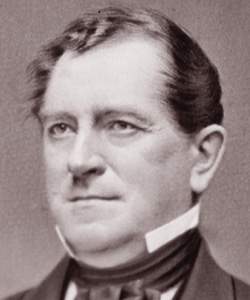Joshua Reed Giddings (Congressional Biographical Directory)
Reference
GIDDINGS, Joshua Reed, a Representative from Ohio; born in Tioga Point (later Athens), Bradford County, Pa., October 6, 1795; moved with his parents to Canandaigua, N.Y., in 1795; received a common-school education; again moved with his parents to Ashtabula County, Ohio, in 1806; completed preparatory studies; served in the War of 1812; taught school; studied law; was admitted to the bar in February 1821 and commenced practice in Jefferson, Ohio; member of the State house of representatives in 1826; elected as a Whig to the Twenty-fifth Congress to fill the vacancy caused by the resignation of Elisha Whittlesey; reelected to the Twenty-sixth and Twenty-seventh Congresses and served from December 3, 1838, until March 22, 1842, when he resigned, after a vote of censure had been passed upon him by the House in response to his motion in defense of the slave mutineers in the Creole case; subsequently elected to the Twenty-seventh Congress to fill the vacancy caused by his own resignation; reelected as a Whig to the Twenty-eighth through Thirtieth Congresses, as a Free-Soil candidate to the Thirty-first through Thirty-third Congresses, elected as an Opposition Party candidate to the Thirty-fourth Congress, and reelected as a Republican to the Thirty-fifth Congress; and served from December 5, 1842, until March 3, 1859; chairman, Committee on Claims (Twenty-seventh and Thirty-fourth Congresses); declined to be a candidate for reelection; appointed consul general to the British North American Provinces by President Lincoln on March 25, 1861, and served until his death; died in Montreal, Canada, May 27, 1864; interment in Oakdale Cemetery, Jefferson, Ohio.
“Giddings, Joshua Reed,” Biographical Directory of the United States Congress, 1774 to Present, http://bioguide.congress.gov/scripts/biodisplay.pl?index=G000167.





